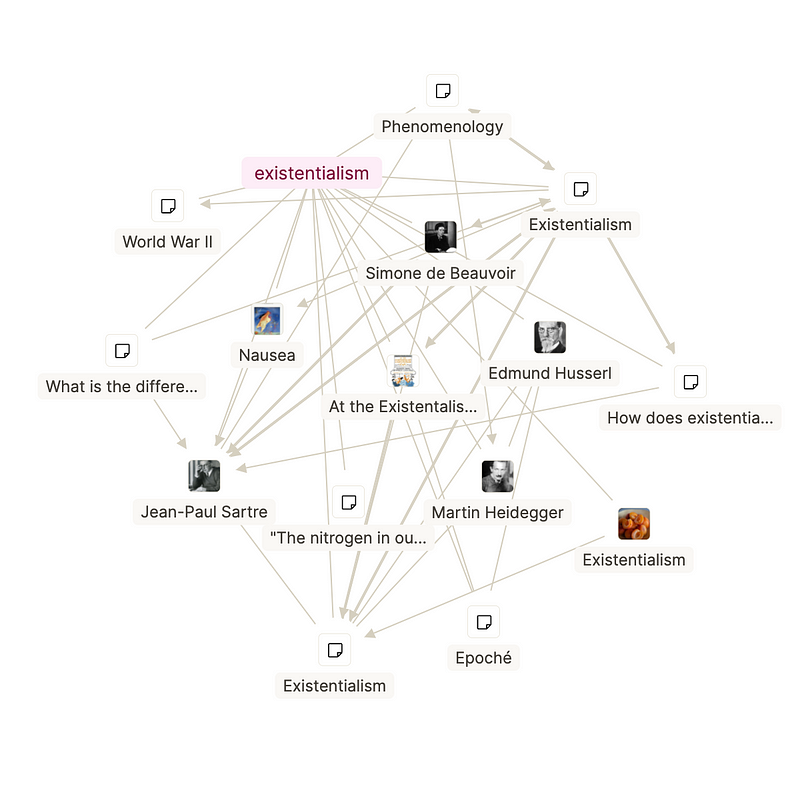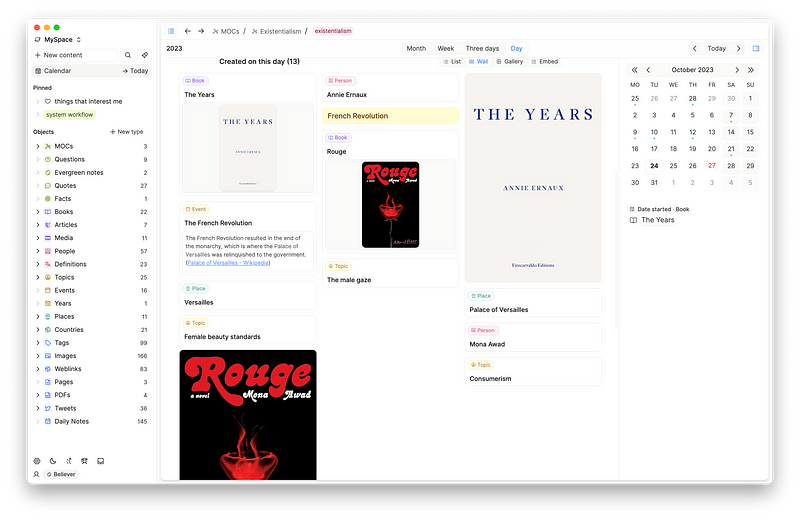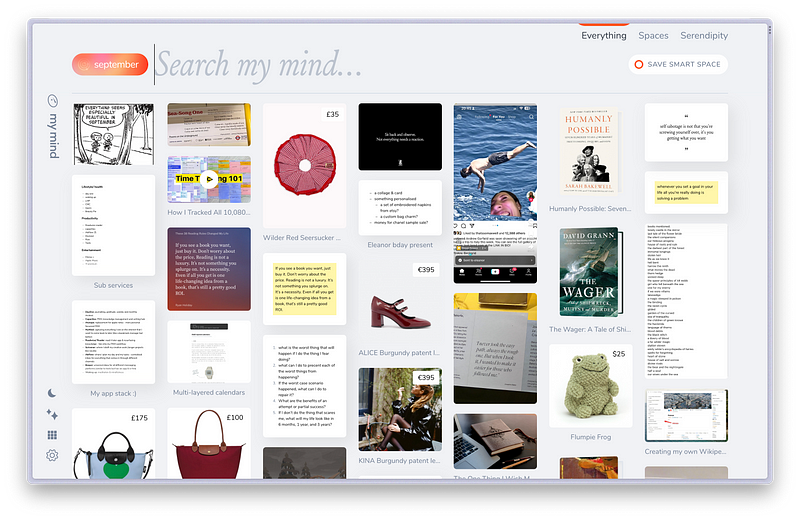Personal Knowledge Management and Note-Taking as a Lifelong Journey
Written on
Chapter 1: The Essence of Personal Knowledge Management
In an era dominated by optimization and the pursuit of efficiency, I have intentionally made room in my life for joy, curiosity, and indulgence. Unlike many who view their Personal Knowledge Management (PKM) systems merely as productivity tools, I perceive my PKM as a practice that I aspire to maintain throughout my life. Similar to my yoga or writing routines, my approach to note-taking and PKM is something I revisit consistently, as it enhances my life and my understanding of the world around me.
For me, this passion originates from my love for note-taking and documentation. I have always kept a notebook handy, constantly jotting down thoughts. To an outsider, my notebooks may appear to be filled with nonsensical musings, lists of peculiar words, and random observations. However, to me, each note encapsulates a particular moment in my life. The brilliant term ‘essence’ used by PKM expert Beth perfectly captures what I aim to achieve with my PKM: connecting and preserving the essence of my knowledge and interests.
To illustrate, let me share what excites me about note-taking, especially in the context of Capacities:
- Delving into various topics and following my curiosity
- Reviving forgotten ideas
- Gaining insight into my interests at different life stages
- Connecting themes across disciplines (such as art, philosophy, politics, history, and film)
Nothing exists in isolation; everything is interconnected. For instance, the impact of World War II and post-liberation thought significantly shaped the rise of existentialism in France, which in turn influenced art, psychology, literature, drama, theology, and numerous other philosophical frameworks. While one could study existentialism or World War II in isolation, this would overlook a broader, richer narrative.

Chapter 2: My Life Intertwined with My PKM
My exploration of themes and topics within Capacities is guided by my interests, often leading me down various rabbit holes. Yet, these ideas represent only one layer of the knowledge web I aim to construct. Another layer consists of my daily experiences and the ‘essence’ I capture each day—current events, travels, and personal interests—all of which influence my understanding of the topics I pursue in Capacities. I have overarching themes that I continuously seek to understand, but my knowledge work is profoundly shaped by my day-to-day life. For instance, a quote from a film may prompt me to watch it, leading me to the book it was based on, and eventually uncovering a historical and cultural context I previously overlooked.
The daily note feature in Capacities plays a crucial role in this process. I seldom write directly in my daily notes, as I prefer to document my day in Day One, my journaling app of choice. Capacities compiles everything I have saved under my daily note, allowing me to revisit what intrigued me on a specific day. This capability enables me to compare saved items with my diary entries and current events, revealing how everything interrelates.

Chapter 3: Embracing Technology and Time Travel
The app mymind has essentially taken over my default Notes app and my physical notebook. This transition is bittersweet; while I cherish the tactile experience of a notebook, mymind has quickly become essential on my iPhone. It offers numerous functions, but its standout feature is its ability to facilitate time travel.
mymind utilizes time-based and natural language searches to bring back everything I saved during a specific timeframe. For instance, I can ask mymind what I saved ‘last week’ or filter by ‘this week’ and ‘type:article’ to quickly find relevant articles I saved. This function is not only brilliant but also incredibly fast and accurate.

I rely on the time-based search in mymind for my weekly and monthly reviews in Day One. By using mymind as a universal inbox, I can extract items and delve deeper into the topics I have saved. This approach adds a personal layer to my PKM system, capturing everything I find interesting throughout my life and online explorations.
Chapter 4: Note-Taking as a Method of Recall
To me, ‘personal knowledge management’ is a straightforward concept. I use Capacities to manage knowledge and information that resonate with my interests and experiences. I don’t have a specific end goal; instead, I take notes for enjoyment and to nurture my curiosity. Although this perspective may not resonate with everyone, it is what makes PKM a life practice for me—something I wish to build upon continually.
My PKM system creates a web of interconnected knowledge that reflects my personal journey, helping me grasp where I am at various points in my life. For example, attending the Mark Rothko exhibition in Paris led me to explore color field painting and modernism, rekindling my interest in modernist literature. All these threads are interconnected, even if they seem loosely tied together.
“What we write down is what we remember. It’s like a time capsule in a way, a lifeline back to the best parts of ourselves. A little popcorn trail of words we can follow so that we never lose sight of the path we’re on.”
This quote from Allison Fallon’s book, The Power of Writing it Down, encapsulates the essence of why I engage in PKM and how it serves as a life practice. My PKM system allows me to weave together my ideas, interests, and experiences, creating a pathway to rediscover different facets of myself over time.
Chapter 5: Influences on My Interconnected Thought Process
My approach to note-taking and interconnected thinking has been profoundly influenced by various books and media I've consumed recently. One remarkable example is The Argonauts by Maggie Nelson, which intricately combines memoir, philosophy, art, and politics in its exploration of gender and motherhood. It’s beautifully crafted and eloquently connects seemingly disparate ideas. Reading her work at university opened my eyes to this style of writing and thinking, and I eagerly await anything she publishes.
Another significant influence is the Material Girls podcast, where Hannah McGregor and Marcelle Kosman analyze events and ideas in pop culture, linking them to historical influences and literature. Listening to academics dissect pop culture in this manner is fascinating, as it emphasizes that everything is connected and informs one another.
Chapter 6: A Final Thought on My Journey
Do I still carry a notebook? Absolutely. Old habits are hard to break, and I appreciate having a notebook accessible for jotting down thoughts or doodling during meetings. However, my PKM practice has undoubtedly become integral to my daily routine. I'm learning so much and enjoying the process too much to give it up now.
I would love to hear how you approach your PKM—whether it’s a tool designed for output or a playful system, or perhaps a combination of both. Please share your thoughts!
Chapter 7: The Dark Truth About Note-Taking and Personal Knowledge Management
In this video, the complexities and misconceptions surrounding note-taking and PKM are explored, revealing deeper insights into their true value.
Chapter 8: Organizing Your Notes: A Rethink
This video offers a fresh perspective on the organization of notes and shares practical tips to enhance your PKM system.